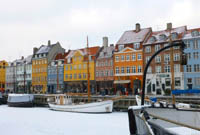Denmark is among the most progressive nations in the world. Initially, the country was mostly known for its iconic architecture and design, but today it is at the forefront in almost every field, including sports, cinema and food. Expats enjoy living in Denmark due to its modern, yet peaceful lifestyle. Here are some of the things you can expect when moving to Denmark.
Language
A number of Danes speak fluent English and many companies also adopt it as their language of choice.It would be quite easy for expats to live and work in Denmark without learning Danish especially because making expats and foreign guests feel welcome and comfortable is part of the public policy. But it’s also quite easy to learn a bit of Danish during your stay since each municipality provides its foreign residents with up to three years of subsidized or free lessons in Danish. Learning the local language is a great way to connect with new acquaintances and forge deeper bonds.
Taxes
Tax residents of Denmark pay taxes on their worldwide income. Expats who are residents of Denmark automatically qualify for tax residency. Even individuals who live in the country for six consecutive months are eligible for tax residency. Once you register with the central tax administration, a tax card is sent to your employer. This ensures that you are taxed correctly. Taxes in Denmark are deducted from the salary before you receive it. Depending on income level, taxation can range from 36 percent to 51 percent. There is also a special taxation policy for expats wherein expats employed by a Danish employer and who earn a minimum of 69,300 DKK a month are taxed at a constant rate of 26 percent for up to 5 years.
The high levels of taxation in Denmark are aimed at creating and sustaining a welfare society. All citizens are accorded equal rights to social security and many services such as education and healthcare are available without any cost. This subsidized welfare model is possible only with high taxes, which is why Denmark has one of the highest taxation levels globally.
Punctuality
Danes are serious about being on time and expect others to do the same. This stems from their desire to be hardworking and productive in all tasks. It is therefore important to be punctual for business meetings as well as other events. In case you are delayed for any reason, it’s best to call and explain the matter, as the meeting is likely to begin and continue on time.
Food and drink
Many still think of Danish food as consisting essentially of potatoes and bacon. But expats will be happy to know that much has changed in the last few years. Danish cuisine has seen a wave of gastronomical change in the form of New Nordic Cuisine. This culinary style handles local ingredients in a completely new way and takes classic Danish dishes to a new level. New Nordic Cuisine was the initiative of René Redzepi and Claus Meyer of Noma, a restaurant that has held the title of ‘Best Restaurant in the World’ by Restaurant magazine for three consecutive years.
When in Denmark, you are bound to encounter the smørrebrød, an open sandwich consisting usually of rye bread and different accompaniments like fish or meat. Unlike other sandwiches, the smørrebrød is eaten with a knife and fork. Danes often have ‘cold table lunches’ where there is a spread of smørrebrød and guests make their own sandwiches. There is usually an order in which to eat the different sandwiches and it’s best to take a cue from the other guests if you don’t know how it’s done. A flavored spirit called Akvavit traditionally accompanies meals. Beer may also be served along with meals.
Tipping
At restaurants, tipping is not common. It is considered unnecessary to tip as the bills include gratuity. But it is often appreciated when customers leave behind a small tip. At some establishments, the menu or final bill may state if a tip is included or not, so you can leave an amount accordingly. It’s also not necessary to tip taxi drivers as their bills also include gratuity, but you can do it if you really liked the service

